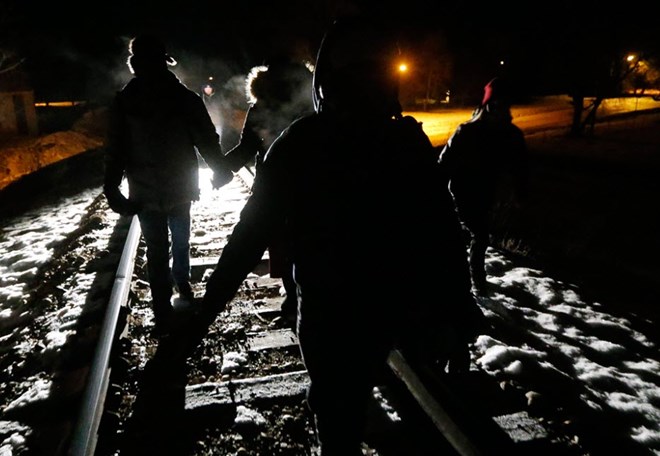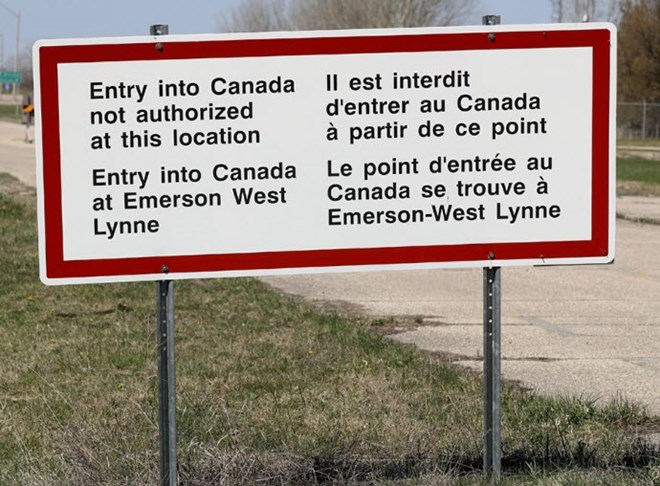
Wednesday February 27, 2019
Adrian Humphreys

A group of Somalis crossed into Canada illegally from the United States by walking down a train track into the town of Emerson, Manitoba, in February 2017.John Woods/The Canadian Press/File
Abdirizak Abdullahi Mohamed was flagged at the border as inadmissible due to the past convictions. ‘This case is a testament that the system works,’ his lawyer says
A Somali man with a list of criminal convictions amassed while living in the United States and who was among the waves of irregular migrants coming to Canada fearing U.S. President Donald Trump’s anti-immigrant rhetoric, has had his refugee claim rejected.
Abdirizak Abdullahi Mohamed was among the hundreds of migrants who illegally entered Canada in 2017 by simply walking from the United States across the largely uncontrolled border into Canada near Emerson, Man., causing concern over border integrity and migrant safety.
It was a time of uncertainty and disarray. In the few months before Mohamed arrived, Trump was imposing travel bans on Muslim countries and generating fear among immigrant communities with crackdowns.
At the same time, Prime Minister Justin Trudeau tweeted a “#WelcomeToCanada” message that became controversial: “To those fleeing persecution, terror & war, Canadians will welcome you, regardless of your faith. Diversity is our strength.”
Between the two well-publicized messages, several hundred people suddenly moved north.
Mohamed’s lawyer, Winnipeg-based Bashir Khan, said this case, seen as a snap shot from the wave of irregular migration, should comfort Canadians about the refugee system rather than cause alarm.
“This case is a testament that the system works — if there are people coming to Canada because they have in their mind a refugee fear, but they got a bit of a history on not following the law that makes you stand out, then you won’t be given access to the refugee protection system in Canada,” said Khan.
“Does everyone just come and we say ‘welcome to Canada’ and give refugee status and they get to live here? Of course not. But fundamental justice requires that they be heard. And he got a chance to be heard.”
Mohamed, a 35-year-old Somali-born man, told immigration authorities his sad background.
He is a member of the Madhiban tribe, a “low caste” tribe traditionally discriminated against in his homeland. During the Somali civil war, his family was attacked — his father was killed and a family member sexually assaulted. He was shot in the leg when he was seven and he and his family fled to a refugee camp in Kenya, he said.

A sign near the border near Emerson, Manitoba, in 2017. Trevor Hagan/The Canadian Press/File
Sponsored by his brother, he and his mother moved to the United States in 2001, but soon after arriving in Minneapolis his brother left and his mother died. With no assistance as a teen, he started drinking and he turned to crime to get by, he said.
It led to a string of arrests in the United States: for robbery, stealing cars, assault, drunk driving, and entering a building without consent with intent to steal.
In 2017, panic was spreading through the Somali community. Trump’s rhetoric against migrants was heating up. Mohamed heard of other Somalis having their status revoked by the Trump administration, he said.
He decided to join other expats heading to Canada. He walked across the border to claim refugee status on April 10, 2017.
That same day he made an asylum claim at the Emerson Port of Entry. A Canada Border Services Agency officer immediately flagged him as inadmissible due to the past convictions. One month later, the Immigration and Refugee Board confirmed he was inadmissible for serious criminality.
Mohamed requested a Pre-Removal Risk Assessment, a process known as a PRRA that could halt his deportation if it would put him at risk of persecution or his life in jeopardy. He argued he faces a grave threat from al-Shabaab extremists, an al-Qaida affiliate, because his tattoos reveal his Westernization.
This past June, his PRRA was rejected. The immigration officer accepted that Mohamed would have a tough time adjusting to life in Somalia — a country he had not seen in 24 years — but would not be in untenable danger.
This month, in a decision recently published by the Federal Court, Justice Glennys McVeigh ruled the decision to send Mohamed back to Somalia was a reasonable one.